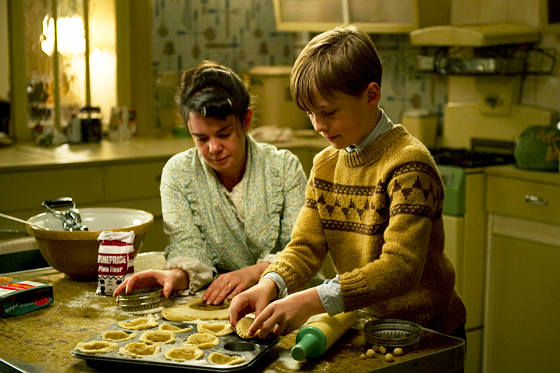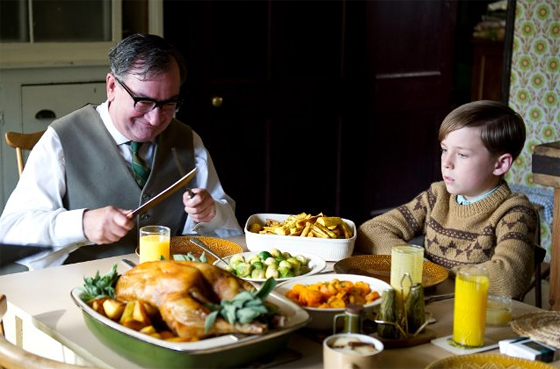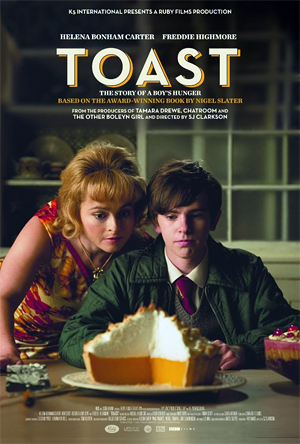
Victoria Hamilton as Nigel's mother and Oscar Kennedy as young Nigel Slater.
The role of food in families -- as both a comfort and a weapon -- is at the heart of this movie, which makes great use of the anguished music of Dusty Springfield for its soundtrack. Dinner time in the Slater household was a desperately unhappy affair. Still, the young Slater finds refuge in food, sneaking cookbooks under the covers to read up on recipes, excelling in his Home Economics class, and triumphing over his stepmom by perfecting his own lemon meringue pie, which pops off the screen as a bright yellow gelatinous mass with a mound of white peaks expertly browned on top.
As in many children's fairy tales, his stepmom also provides his liberation: Following his father's death he simply walks out of her life and flees to London, where a future in food is his for the taking, and he never sees her again.
In a sweet end note, Slater appears in a cameo as himself, reassuring his younger self, who is desperate to find a kitchen job (at the Savoy Hotel, no less) that everything will be fine.
Fortunately for the food world, it is. Slater is the author of ten books, many bestsellers, including Real Fast Food, Appetite, and The Kitchen Diaries. A food columnist for The Observer for almost two decades, Toast the memoir, which won several major awards, including British Biography of the Year, began marinating as a column.

Ken Stott as Nigel's father and Oscar Kennedy as young Nigel Slater.
Perhaps unsurprisingly, the adult Slater is not fond of fussy food, he prefers simple suppers made with care and thought, using quality ingredients. And despite his upbringing, he believes that making something good to eat for yourself or for others can lift the spirits in the way little else can.
(In an interesting twist, the daughters of Slater's now deceased stepmother denounced his portrayal of her in the British press earlier this year. The very different accounts of their childhood years serves to remind us that every person's version of the truth can vary wildly. On this much, though, all parties seem to agree: Slater's early years were full of rejection and loss. Indeed the subtitle of his book "A Boy and His Hunger" is both a nod to his need for real, nourishing food and genuine, nourishing love.)
When asked what's missing from the movie, Slater responds without missing a beat: The sex. "Toast is a sexy little book, there's a lot of adolescent sex in those pages and they form an integral part of the story," he said in an interview yesterday. "It doesn't really matter in the movie but honestly I would have liked to have seen a bit more of it. "Toast" was made for prime-time viewing in Britain at Christmas, and I think they wanted a film that the whole family could watch, not something adolescent boys might squirm at."
The movie only hints at the teenage Slater's emerging sexuality; it reveals his crush on a family gardener and a first kiss in the woods with a local boy.
Fans of the food writer's memoir should not hold their breath for Toast: The Second Slice. Here's why: "I'm a very private person and tend to keep to myself, in part because I don't think I'm that interesting," Slater said. "That memoir was the most intimate of memoirs and to this day I don't really know why I did it. But I was writing as a little boy and I was somehow able to differentiate it from my adult self. I stopped at 18 and I've protected myself ever since, I went back into my shell."
There's more. "In practical terms, if I were to do a second book, it would be more a conventional memoir," he said, adding, "and I'd have to write about other people's lives, people who are still alive, and I don't want to intrude on their privacy."
At a time when many of us wax on about the pleasures of the table (this writer included), "Toast" reminds us that food can cause major misery in many people's lives. Audience goers will likely find themselves reflecting on their own childhood food memories while watching the film. Thankfully, this being a decidedly British film, there's a lot of black humor amid the sorrow.
Just as well, too, because this writer, who wanted to rush home and bake her teenage son a cake after seeing the film, found herself wincing at the pain of it all at times.
"Toast" opens in Bay Area cinemas this Friday.
 Gosh the Brits know how to do misery, don't they? Miserable weather, miserable class distinctions, miserable food, circa 1960s at least. (The Anglophiles among us need not get their knickers in a twist: Word that there's now fab fare to be found in Britain has leaked out.)
Gosh the Brits know how to do misery, don't they? Miserable weather, miserable class distinctions, miserable food, circa 1960s at least. (The Anglophiles among us need not get their knickers in a twist: Word that there's now fab fare to be found in Britain has leaked out.)
